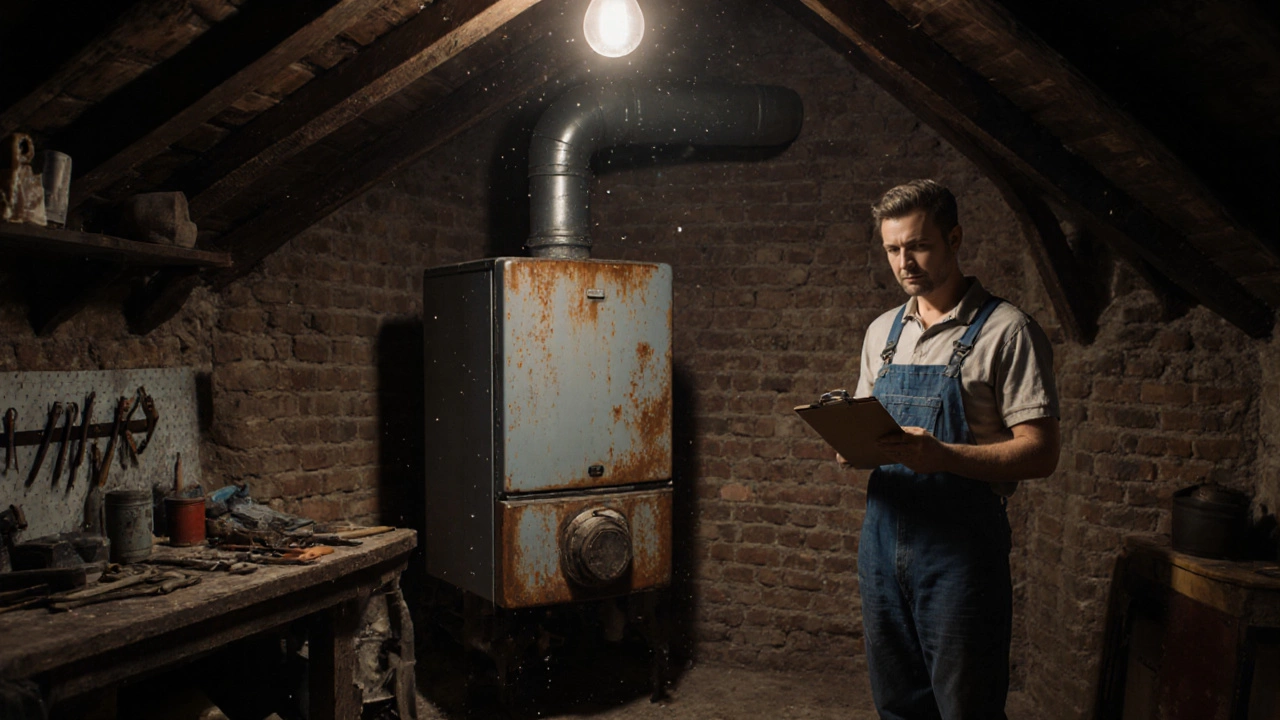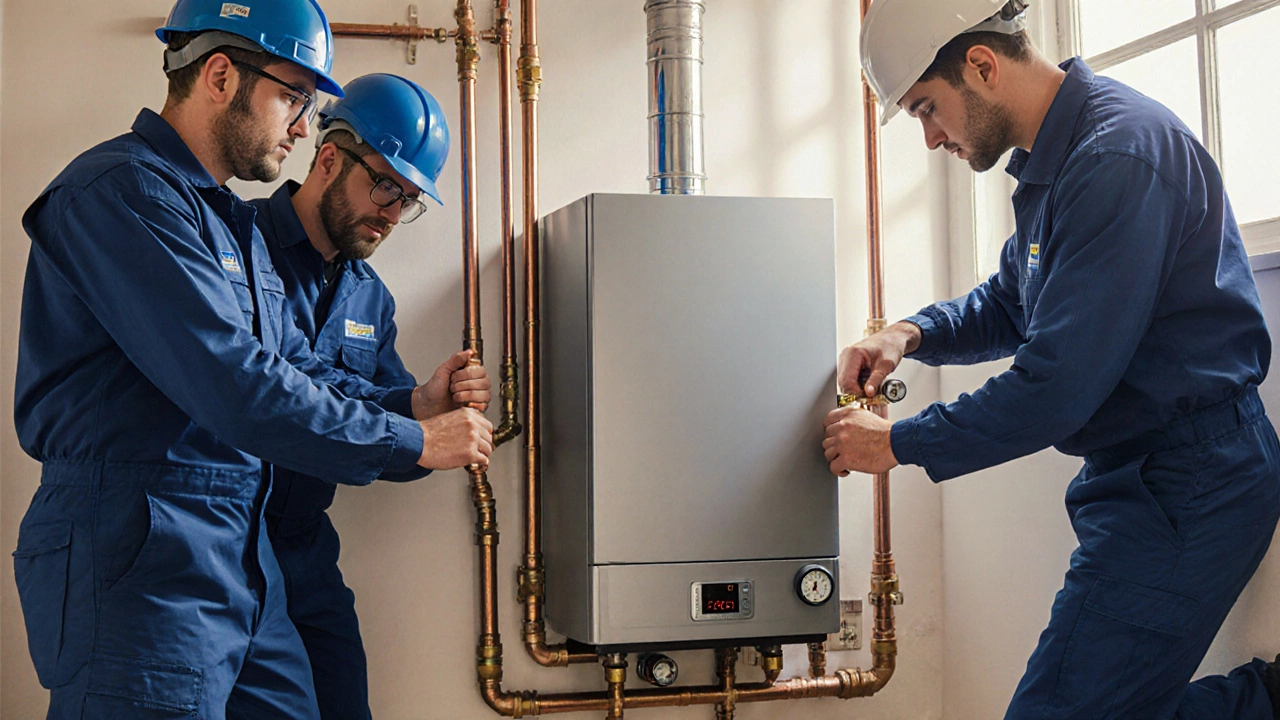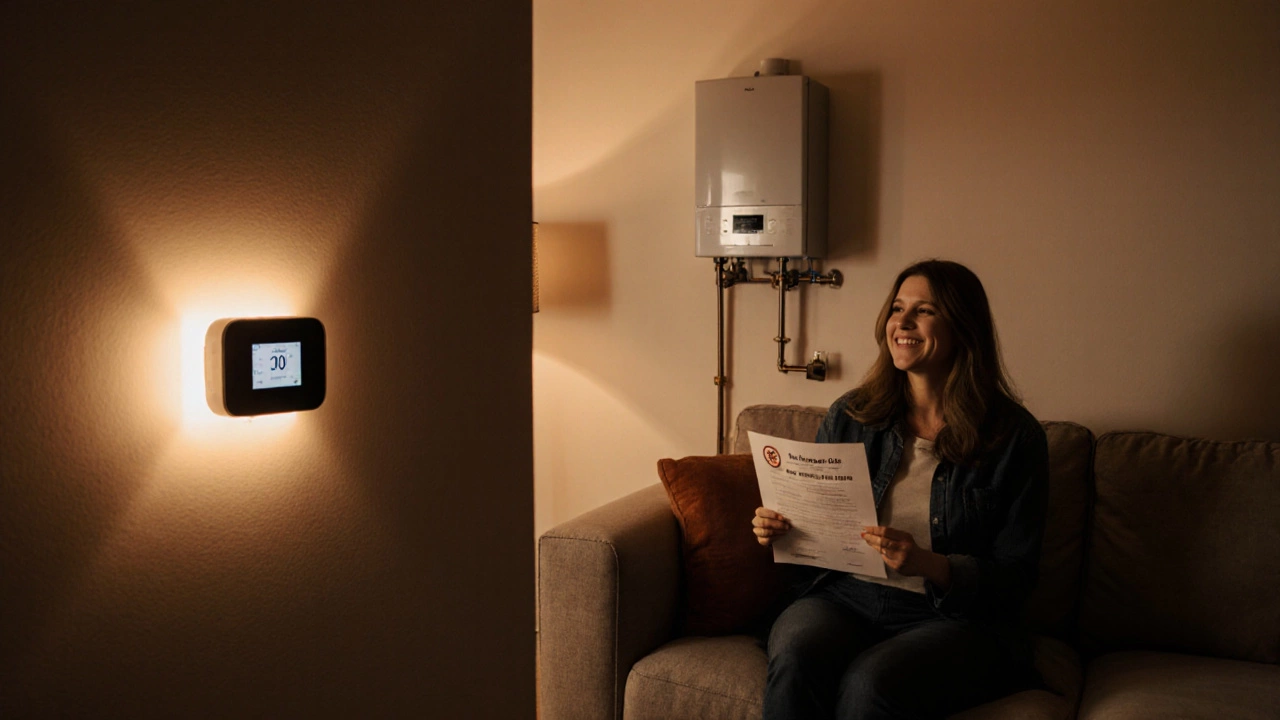
- 22 Oct 2025
- Gideon Thornton
- 0
Boiler Replacement Time Calculator
Estimate Your Installation Time
Select your options to see the estimated installation time.
When the old boiler finally conks out, the first question that pops into most homeowners’ heads is: how long does a boiler replacement take? The answer isn’t a one‑size‑fits‑all number - it depends on the type of boiler, the size of the house, the condition of the existing pipework and how quickly you can line up a qualified installer. In this guide we’ll walk through every step of the process, break down typical time ranges, and give you a handy checklist so you know exactly what to expect from start to finish.
What a Boiler Actually Is
Boiler is a sealed vessel that heats water for central heating and domestic hot‑water supply. Modern boilers are far more efficient than the old iron‑clad models from the 1970s, thanks to condensing technology and precise control systems. When a boiler reaches the end of its service life, swapping it out isn’t just about getting hot water back - it’s about upgrading your home’s energy performance and avoiding costly breakdowns.
Key Factors That Influence Installation Time
- Boiler type - A combi, system or regular (conventional) boiler each have different pipe layouts.
- Age and condition of existing pipework - Old or rusted pipe can add extra hours for removal and replacement.
- Location of the new unit - Installing in a cramped loft or a cramped under‑stair cupboard can slow the crew down.
- Accessibility of the gas supply - Some homes need a new gas pipe run, which is a separate task.
- Regulatory checks - A certified engineer must test gas tightness and flow rates before the system is signed off.
Typical Time Ranges by Boiler Type
Below is a quick snapshot of how long each major boiler category usually takes, assuming a standard three‑bedroom house in the UK.
| Boiler Type | Typical House Size | Average Installation Time | Best For |
|---|---|---|---|
| Combi boiler | 1‑3 bedrooms | 4‑6 hours | Homes without a separate hot‑water cylinder |
| System boiler | 2‑4 bedrooms | 6‑8 hours | Properties that need a hot‑water tank but want a compact layout |
| Regular boiler | 3‑5+ bedrooms | 8‑12 hours | Large homes with multiple radiators and a separate cylinder |

Step‑By‑Step Timeline
- Initial assessment (1‑2 hours)
The engineer visits, checks the existing boiler, measures pipework, and notes any quirks like non‑standard valve sizes. This is also when you’ll discuss the best boiler type for your home.
- Quotation and ordering (1‑3 days)
After the assessment you receive a written quote. Once you approve, the new boiler is ordered - most reputable suppliers can deliver within 48‑72 hours.
- Preparation of the work area (30‑60 minutes)
Technicians clear a safe workspace, shut off the gas, electricity and water, and drain the system.
- Removal of the old boiler (1‑2 hours)
The old unit is disconnected, lifted out, and disposed of responsibly. If the old pipework is corroded, it will be stripped at this stage.
- Installation of the new boiler (3‑6 hours)
Depending on the chosen type, the crew will mount the boiler, connect the gas line, hook up the central‑heating circuit, and attach the domestic‑hot‑water pipework. For a condensing boiler, an additional condensate pipe is fitted to discharge acidic water safely.
- System fill, bleed and pressure test (30‑45 minutes)
Water is re‑introduced, air is bled from radiators, and the system is pressurized to the manufacturer’s specification (usually 1‑1.5 bar when cold).
- Gas safety check and certification (30‑60 minutes)
A Gas Safe registered engineer conducts a leak test, measures flue draft, and issues a certificate of compliance.
- Final walkthrough and user briefing (15‑30 minutes)
Technicians show you how to operate the thermostat, set timers, and explain routine maintenance like annual service checks.
All told, a straightforward combi boiler swap in a typical three‑bedroom home can be wrapped up in a single working day (about 8‑10 hours total). Larger properties or installations that require new pipework can stretch to two full days.
Common Delays and How to Avoid Them
- Unexpected pipe corrosion: Have a pre‑inspection of the existing copper or steel pipe. If the engineer spots rust, schedule a brief extra session for pipe replacement before the new boiler arrives.
- Building regulations paperwork: In England, replacing a gas‑fired boiler usually doesn’t need a full planning permission, but you do need a Gas Safe registration. Order the paperwork ahead of time.
- Access issues: Measure doorways, stairwells and lift capacities before the installer arrives. If a large system boiler needs to go through a tight hallway, consider a smaller model or request a professional mover.
- Late parts delivery: Choose a reputable supplier who stocks the model you want. For high‑efficiency condensing boilers, ordering a week in advance is safest.
Cost vs. Time - What’s the Trade‑off?
Speed isn’t the only factor. A cheaper, low‑efficiency boiler might arrive sooner, but you’ll likely pay more in fuel bills. A high‑efficiency condensing boiler with a good SAP rating (e.g., A‑rating) may need a few extra hours for proper pipe sizing, but it can shave 10‑15% off your annual gas costs.

Quick Checklist Before You Book
- Confirm the boiler type that matches your home’s layout.
- Ask the installer for a written estimate that includes labour, disposal, and any pipe‑work upgrades.
- Check that the engineer is Gas Safe registered (UK requirement).
- Clear the installation area - move furniture, protect flooring.
- Arrange a convenient day when you can be home for the safety certificate hand‑over.
After‑Installation: What to Watch For
Even after a perfect fit, give the system a day or two of normal use. Keep an eye on:
- Unusual noises from the boiler or radiators - could signal air in the system.
- Leaking around pipe joints - a sign of improper sealing.
- Fluctuating water temperature - may need fine‑tuning of the thermostat settings.
If anything feels off, call the installer within the first 48 hours - most reputable companies will correct issues at no extra charge.
Frequently Asked Questions
How many days does a boiler replacement usually take?
For a typical three‑bedroom home with a combi boiler, the whole job can be finished in one day (about 8‑10 hours). Larger homes or those needing new pipework may need two days.
Do I need a permit to replace my boiler?
In England, you don’t need planning permission for a boiler swap, but the installer must be Gas Safe registered and provide a safety certificate after the work.
What’s the difference between a combi and a system boiler?
A combi boiler heats water on demand and supplies hot taps directly - no cylinder needed. A system boiler still uses a cylinder for hot water but has most of the boiler’s components built‑in, so pipework is shorter than a regular boiler.
Can I stay at home while the boiler is being replaced?
Yes. Most installers will keep the gas shut off only for the short periods when they’re disconnecting or testing the unit. You’ll just need to stay away from the work area for safety.
How much does a boiler replacement usually cost?
Costs vary widely. A basic combi boiler installation in the UK typically runs £1,500‑£2,500 including labour. High‑efficiency condensing models with extra pipework can reach £3,500‑£4,500.
Knowing the typical timeline helps you plan around work, school holidays or any other commitments. With the right preparation, a boiler replacement can be a smooth, low‑stress upgrade that keeps your home warm for years to come.

